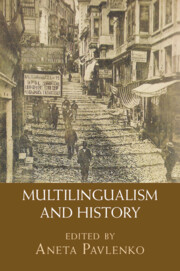Book contents
- Multilingualism and History
- Multilingualism and History
- Copyright page
- Contents
- Figures
- Contributors
- Acknowledgments
- 1 Multilingualism and Historical Amnesia: An Introduction
- 2 Greek Meets Egyptian at the Temple Gate: Bilingual Papyri from Hellenistic and Roman Egypt (Third Century BCE–Fourth Century CE)
- 3 Language Shift, Attitudes and Management in the Roman West
- 4 Languages at War: Military Interpreters in Antiquity and the Modern World
- 5 How Multilingualism Came to Be Ignored in the History of Standard English
- 6 Multilingualism and the Attitude toward French in the Latin Kingdom of Jerusalem
- 7 Why Colonial Dutch Failed to Become a Global Lingua Franca
- 8 How Unique Was Russia’s Multilingual Elite?
- 9 Language Ideology and Observation: Nineteenth-Century Scholars in Northwestern Siberia
- 10 Studying Historical Multilingualism in Everyday Life: The Case of the Habsburg Monarchy in the Nineteenth Century
- 11 Multilingualism and the End of the Ottoman Empire: Language, Script, and the Quest for the ‘Modern’
- 12 “Multilingualism Is Now a Must”: Discourses on Languages and International Cooperation at the Council of Europe
- 13 The Role of the Past in Language Revitalization
- 14 Historic Reenactments in Contemporary Spain: Fiestas de moros y cristianos
- 15 Multilingual Ghost Signs: Dissonant Languages in the Landscape of Memory
- Index
- References
7 - Why Colonial Dutch Failed to Become a Global Lingua Franca
Published online by Cambridge University Press: 20 April 2023
- Multilingualism and History
- Multilingualism and History
- Copyright page
- Contents
- Figures
- Contributors
- Acknowledgments
- 1 Multilingualism and Historical Amnesia: An Introduction
- 2 Greek Meets Egyptian at the Temple Gate: Bilingual Papyri from Hellenistic and Roman Egypt (Third Century BCE–Fourth Century CE)
- 3 Language Shift, Attitudes and Management in the Roman West
- 4 Languages at War: Military Interpreters in Antiquity and the Modern World
- 5 How Multilingualism Came to Be Ignored in the History of Standard English
- 6 Multilingualism and the Attitude toward French in the Latin Kingdom of Jerusalem
- 7 Why Colonial Dutch Failed to Become a Global Lingua Franca
- 8 How Unique Was Russia’s Multilingual Elite?
- 9 Language Ideology and Observation: Nineteenth-Century Scholars in Northwestern Siberia
- 10 Studying Historical Multilingualism in Everyday Life: The Case of the Habsburg Monarchy in the Nineteenth Century
- 11 Multilingualism and the End of the Ottoman Empire: Language, Script, and the Quest for the ‘Modern’
- 12 “Multilingualism Is Now a Must”: Discourses on Languages and International Cooperation at the Council of Europe
- 13 The Role of the Past in Language Revitalization
- 14 Historic Reenactments in Contemporary Spain: Fiestas de moros y cristianos
- 15 Multilingual Ghost Signs: Dissonant Languages in the Landscape of Memory
- Index
- References
Summary
The Low Countries have a tradition of language contact and conflict and, after a short overview of the situation, the main focus of this chapter will be on “Colonial Dutch”, i.e., language planning and practice in some of the former colonies of the Netherlands, including Indonesia, Suriname, and the Caribbean islands. In doing so, this chapter will provide some answers to the fascinating question of why colonial Dutch failed to become a global lingua franca, as opposed to English, French, Spanish, and Portuguese that did (partially) succeed in doing so.
Keywords
- Type
- Chapter
- Information
- Multilingualism and History , pp. 138 - 152Publisher: Cambridge University PressPrint publication year: 2023

